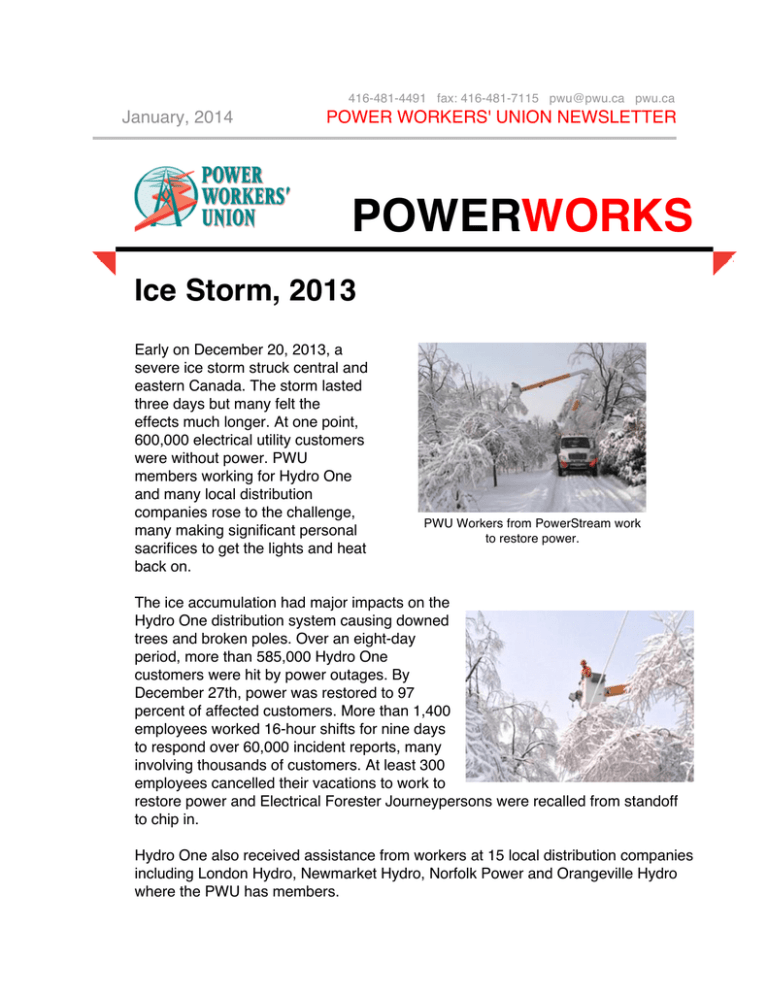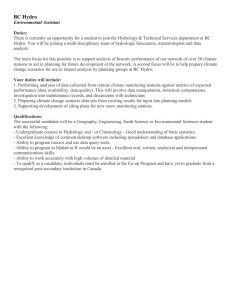
416-481-4491 fax: 416-481-7115 pwu@pwu.ca pwu.ca
January, 2014
POWER WORKERS' UNION NEWSLETTER
POWERWORKS
Ice Storm, 2013
Early on December 20, 2013, a
severe ice storm struck central and
eastern Canada. The storm lasted
three days but many felt the
effects much longer. At one point,
600,000 electrical utility customers
were without power. PWU
members working for Hydro One
and many local distribution
companies rose to the challenge,
many making significant personal
sacrifices to get the lights and heat
back on.
PWU Workers from PowerStream work
to restore power.
The ice accumulation had major impacts on the
Hydro One distribution system causing downed
trees and broken poles. Over an eight-day
period, more than 585,000 Hydro One
customers were hit by power outages. By
December 27th, power was restored to 97
percent of affected customers. More than 1,400
employees worked 16-hour shifts for nine days
to respond over 60,000 incident reports, many
involving thousands of customers. At least 300
employees cancelled their vacations to work to
restore power and Electrical Forester Journeypersons were recalled from standoff
to chip in.
Hydro One also received assistance from workers at 15 local distribution companies
including London Hydro, Newmarket Hydro, Norfolk Power and Orangeville Hydro
where the PWU has members.
PowerStream lost about 92,000 customers and Whitby Hydro, Halton Hills Hydro
and Milton Hydro lost thousands more.
Here was the experience of PWU member Steve Payne from Hydro One Forestry
based in Barrie:
The storm hit the afternoon of Saturday December 21st. I went to work on
Monday December 23rd at 5 a.m. I drove to Guelph and the ice on the trees got
heavier as I went. It was very heavy near Caledon and Orangeville. The Town
of Fergus had no power at all when I went through.
When I got to the Guelph area office, there was about two inches of ice on
everything. That's not quite as much as the ice storm of 1998 when there was
about four inches of ice.
We got our orders to meet up with a Hydro
One line crew from Blind River. They were
working on three-phase line south of
Guelph. Upon meeting this crew, we were
shown the section of line that was isolated
and de-energized. The line crew flagged
traffic for us while we started removing
hanging and broken limbs off the line. That
job took us a few hours until the linemen were
able to give the all clear and reactivate the
line.
For the next few days we worked on singlephase lines in 16-hour shifts. Fallen trees
caused most of the line problems. The
conifers caused the largest problems since
they keep their needles year round and
leaned most heavily on the lines. The deciduous tress looked like chandeliers.
Some side roads had the lines hidden under leaning trees. In other places, the
weight of the ice caused the lines to snap.
My forestry partner and I used a 55-foot lift and a hydraulic saw. The saw
allowed us to cut off hanging limbs from about six feet away, which reduced the
possibility of getting hit by trees and wires under tension.
My crew got to go home on Christmas Eve but was back at it at 8 a.m. on
Boxing Day. We were finally released to go home on December 29th.
2
The homeowners in the Guelph area were great. They thanked us for our
efforts and even dropped off coffee. The Blind River Line crew worked on
Christmas Day and a thoughtful homeowner brought them some turkey dinner!
Rudy Kerec worked on a Hydro One line crew during the storm out of his Thorold
home base. Here's how it went for him:
I was called late on Saturday December 21st and was told to report for work the
next day at 7 a.m. Our entire shop was called out. Apart from Christmas Day,
we worked 16-hour days for eight days straight. On Christmas Day itself, we
still had to work six hours, one of 5 a.m. to 11 a.m., 11 a.m. to 5 p.m. or 5 p.m.
to 11 p.m. I chose the last shift so that I
could be with my young family on
Christmas morning.
I was working with an apprentice crew
dealing with off-road incidents, which can
be tough. It varied between wires down in
the bush and climbing trees. We had some
real challenges putting in new poles in
steep terrain that the buckets couldn't
reach. We'd use the digger to drill the holes
and then climb the poles to string the wires.
The work was hard because it was bitterly cold
and wet. But there were so many people who
didn't have power. We were able to restore
electricity to about one hundred people for
Christmas Eve and Christmas morning even
though we had to cut it off again to do more work.
Those people were especially grateful.
One special memory came when my young crew
complained that they were starving on Christmas
Day. They used their iPhones to track down a
Starbucks in Waterdown. Although the outlet only
had breakfast sandwiches, that became our
Christmas dinner, which we shared with an OPP
officer and an older couple who were without
power and were looking for someplace warm.
3
Mark Evans is a Hydro One lineman working on a
travelling line crew out of Toronto and he reported the
following experience:
I was deployed on Saturday night before the worst of
the storm had hit. I called around to our crews and
three-quarters of them were available immediately. I
was sent first to Orangeville, which wasn't too bad,
but things just started snowballing. We were then
dispatched to Bolton where a major circuit serving
12,000 customers had been knocked out.
We worked 16-hour shifts for eight days right
through Christmas and Boxing Day. We worked all
over including parts of Toronto and Newmarket. Because of the volume of
calls, we were often waiting a while for pole locates. The conditions were frigid
with icy roads and ice covering everything. The biggest challenges were the
snapped lines.
In the end, this storm response speaks to the best of our Union. PWU members
were willing to band together in trying circumstances, even if it meant sacrificing
their holidays, to help people out.
The Canadian Tire group of
companies donated some $1,000,000
in gift cards to hydro workers province
wide as a thank you for their efforts
and, in turn, the donation was
directed to the Canadian Red Cross
(Ontario Branch). A sign outside a
local church said it best: "Merry
Christmas and God bless the hydro
workers!"
On December 27th, Hydro One sent
PWU Member Paul Murray from the Electrical Safety
crews to help Toronto restoration
Authority talks to a Toronto homeowner.
efforts after bringing back service to
their own customers. Toronto Hydro
was hit hard by the storm losing power to more than 300,000 customers by the
afternoon of December 22nd. Workers, including PWU members, from nine other
utility companies from around Ontario, Manitoba and Michigan came to help out.
In a non-descript building in central Ontario is the heart of Ontario's electrical grid.
The Ontario Grid Control Centre (OGCC) houses the Dispatchers who assess,
4
organize and dispatch all electrical trouble calls for Hydro One and the Electrical
Controllers who operate 97 percent of the high-tension electrical system for the
province. The OGCC became Hydro One's focal point for organizing ice storm
restoration activities and these PWU members were put to the ultimate test during
the ice storm.
Here are two of their stories:
Danielle Leslie (Dispatcher; Dispatchers assess trouble
tickets submitted from the Hydro One Call centres and
organize the information that is forwarded to the appropriate
work crews.)
On Dec 22, 2013, many Hydro One customers awoke
without power. The ice storm was one of the most
damaging Ontarians have seen in years. The damaging
winds, freezing rain and countless fallen trees resulted in
37,445 calls from customers and emergency services and
2,800 individual incidents that required a crew.
As a dispatcher, storms are part of the job and monitoring the weather
becomes a force of habit. It's the number one predictor of whether you are
going to have a normal or hectic day. The role of a dispatcher is to prioritize and
track crew responses, monitor the outages, and provide customer support to
ensure the quickest restoration time. For many dispatchers, this storm was the
most demanding one they have seen in their careers. Our screens were filled
with calls from customers, phones were ringing and circuits were tripping.
By Christmas Eve, the number of incidents was reduced to 900 but 27,300
customers were still without power and the workload at the OGCC was still at
an all-time high. Many dispatchers had to sacrifice time with their family and
friends during the holiday season to assist in the restoration efforts across the
province. The restoration efforts lasted over a week with many people stepping
up to the plate and putting in the extra effort to ensure that our customers would
have power as soon as possible. We came together as a PWU collective with
our brothers and sisters in different utilities and sectors pitching in to help our
fellow residents in a time of dire need.
Hafiz Lalani (Controller; Controllers are responsible for running
grid activities including monitoring for any abnormal conditions
and responding to alarms.)
When the storm hit, I was called in to be on shift to assist
with the work that flooded into the Control Room. This storm
5
was different than most winter storms. The northern part of the province was,
for the most part, unaffected. The urban areas in and around the GTA were hit
hardest.
On the two worst days (the 22nd and 23rd), we had 1,126 breaker outages
resulting in over 300,000 people being without power outside of Toronto. There
were also may unlogged cases of partial feeder outages where the station
breakers remained closed but there were outages to portions of the feeds to
various customers from devices opening up part way along the line.
Over the course of the four days that it took to get the power back for the
majority of affected customers, it was amazing to see the number of dedicated
people that were working throughout the different utilities and disciplines. I
worked my 12-hour shift from 6:30 p.m. on the 24th through to 6:30 a.m. on the
25th but it wasn't till well after 1 p.m. that we finished up the day's paperwork.
Even then, there was still more going on through Boxing Day with the 27th
becoming a normal day. To see this event and be part of it was truly an eye
opener and shows the real value and expertise of all the people of various
disciplines from Operators to Lines and Forestry to Stations staff along with
many more.
The PWU is very proud of the way our members and our industry responded to this
widespread emergency and the needs of people in the affected communities - it's
what we do!
Bargaining Calendar, 2014
Sector 1
Expiry
AMEC Nuclear Safety Solutions
3/31/2013
Atomic Energy of Canada Ltd. (Chalk River)
3/31/2014
Bruce Power
12/31/2013
Compass Food Service Workers (Darlington)
12/31/2014
Compass Food Service Workers (Pickering)
11/21/2013
Nuclear Waste Management Organization
3/31/2014
Nuvia-Canada
12/31/2014
Sector 2
Atlantic Power
12/19/2013
Brighton Beach Power
11/15/2014
Lake Superior Power
12/31/2013
6
Sector 3
County of Brant
4/30/2014
Electrical Safety Authority
3/31/2014
Entegrus Powerlines
12/31/2014
Grimsby Power
5/31/2014
Independent Electricity System Operator
3/31/2014
Norfolk Power Distribution
12/31/2013
Orangeville Hydro Ltd.
9/30/2014
PUC Services (Inside)
4/30/2014
PUC Services (Outside)
4/30/2014
Kincardine Cable TV (Rogers)
1/31/2014
Settlement with Hydro One Protects
PWU Jobs at Inergi and Vertex
In December, Hydro One and the PWU reached a mediated settlement agreement
covering work conducted by two Ontario Hydro successor companies - Inergi and
Vertex. Hydro One had announced that it would be tendering the work presently
being conducted by Inergi and Vertex. Although the two companies are expected to
bid on the respective work packages, there will likely be other bidders and Hydro
One will make the ultimate decision. If either Inergi or Vertex were not successful,
jobs would have been put at risk and, accordingly, the PWU filed a grievance.
If Inergi and Vertex are the successful bidders, the PWU's bargaining rights will
carry on at those companies as will the employment of its members. The settlement
requires that Hydro One amend its Request for Proposal (RFP) to require all
bidders, as a condition of being permitted to bid, to recognize the PWU as
bargaining agent and to conclude a labour agreement with the PWU. The
settlement will help set the stage for the protection of jobs, wages and benefits for
PWU members at Inergi and Vertex for the multi-year term of the new services
contracts resulting from the RFP process.
7
PWU Members Complete Health and
Safety Instructors Course
The PWU graduated 13 Workers' Health
and Safety Centre (WH&SC) Instructors in
early November. These new instructors will
be able to teach PWU Health and Safety
(H&S) Accreditation training, H&S
Certification training and reach out in
collaboration with the WH&SC to provide
much needed H&S training to workers in
their communities. The graduates came
from a diverse selection of employers and
each person brings workplace experience that enhances their ability to deliver H&S
training.
Instructor training encompassed two weeks of training under the leadership of
Wayne Galandy from the WH&SC. The students learned how best to teach adults.
Each student had to make presentations to the class three times over the two-week
period. Each presentation became successively more complex and the final
presentation comprised one of the WH&SC basic certification H&S modules.
In the coming months, the new instructors will either be teaching PWU H&S
Accreditation training or co-piloting with experienced instructors to gain some
confidence. Some of the new instructors will be in the classroom as early as
February.
8
Last Coal Burned At Nanticoke
Generating Station
December 2013 saw the shutdown of
the Nanticoke Generating Station
when it finished burning the last of its
coal supplies. Nanticoke was the
largest coal-fired station in North
America and had been in operation
since 1972. Lambton Generating
Station used the last of its
coal supplies in September. The
PWU has been working closely with
Ontario Power Generation (OPG) to
ensure that member redeployments
and voluntary separations are carried
out in accordance with the Collective
Agreement, which includes
provisions specifically negotiated for
the closure of OPG coal stations.
The Union will continue to advocate for the conversion of the Nanticoke and
Lambton stations to biomass.
The Atikokan Generating Station stopped using coal in September 2012 and is
being converted to use carbon-neutral biomass as fuel. It will be the largest 100
percent biomass-fuelled generating station in North America and is expected to be
in service later this year.
In November, the Ontario Minister of Energy, Bob Chiarelli, announced that the
Thunder Bay Generating Station would continue to use coal through 2014, when
one unit will be converted to advanced biomass fuel. This notice of fuel change
triggered the coal closure language in the collective agreement. The PWU plans to
meet with OPG in early February to begin working through implementation issues.
The Union will ensure that any affected members will get the full protection of the
relevant Collective Agreement provisions.
9
PWU and Hydro One Reach Multi-Year
Forestry Staffing Agreement
Late in 2013, the PWU came to agreement with Hydro One
concerning the staffing of its forestry program. Instead of
year-to-year staffing decisions, the parties have agreed to a
multi-year staffing plan out to 2018 with a set number of
Regular positions to be posted and filled in each year. The
agreement is intended to enable a projected vegetation
management work cycle of seven to eight years utilizing
additional Regular hires along with Hiring Hall members
including apprentices. The settlement is good news for both
Regular and Hiring Hall members, providing needed clarity
about the company's forestry staffing plan.
Further information is available from Hydro One Chief
Stewards.
PWU Members Ratify Collective
Agreements at the Portlands Energy
Centre and Lake Superior Power
PWU members at the Portlands Energy Centre recently ratified a no concession
three-year collective agreement that included improvements to wages and shift
differentials and paid lunches for maintenance staff.
10
Members at Lake Superior Power ratified a one-year extension to the current
collective agreement with a general wage increase of 2.75 percent. The company is
currently pursuing a new Power Purchase Agreement with the Ontario Power
Authority.
Public Policy Forum Releases Report
on the Future of the Canadian Nuclear
Industry
In January, the Public Policy Forum, an
independent, not-for-profit Canadian think tank,
issued a report entitled Canada's Nuclear Energy
Sector: Where to From Here? The report noted that
"there is a potential strong future for the Canadian
nuclear energy sector, and that it has an important
role to play both domestically and abroad." At the
same time, the industry faces a number of
challenges that have impaired its ability to grow. The
PWU was one of the report's sponsors. We also
hosted one workshop of industry experts and
participated in others as part of the study. The report
can be found at
http://ppforum.com/publications/canadas-nuclearenergy-sector-where-here-final-report.
PWU Participates in Movember
PWU members across Ontario participated in
last year's Movember, an annual event
involving the growing of moustaches during
the month of November to raise awareness of
prostate cancer. One group of PWU
representatives, pictured here, raised $2,400.
Left to Right: Bryan Roberts, Paul Reece,
Glenn Dawson, Bob Walker, Steve Payne,
Ted Taylor, Steve Allan, Paul Garden,
Craig Middleton, Dave Watt
11
Please forward to all members and post. A PDF version can be found at pwu.ca.
Copyright © 2014. Power Workers' Union. All Rights Reserved.
12



